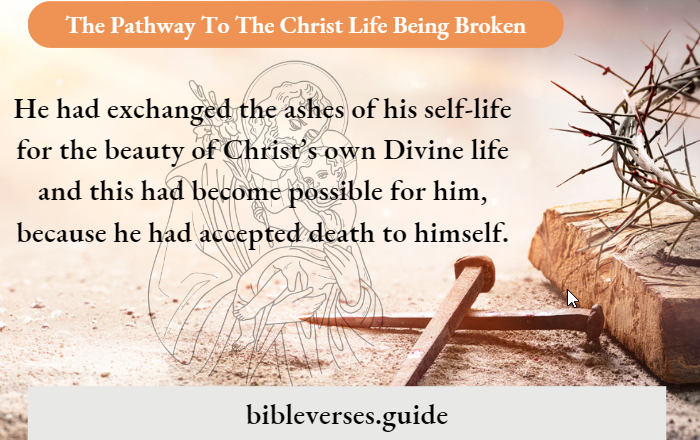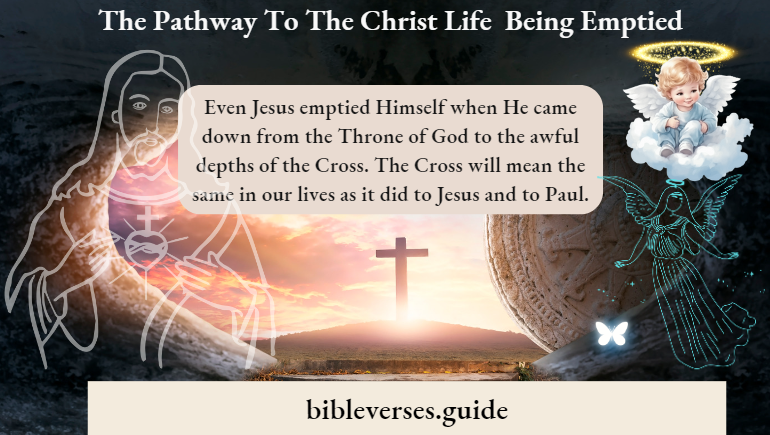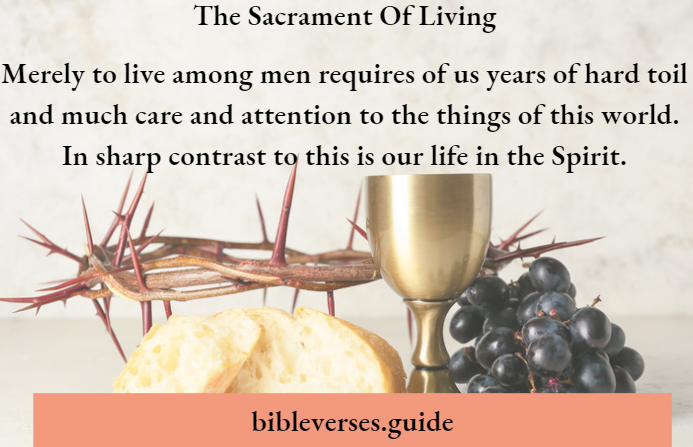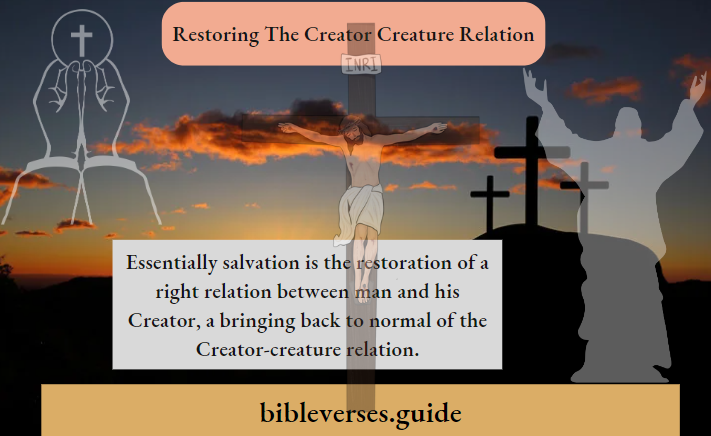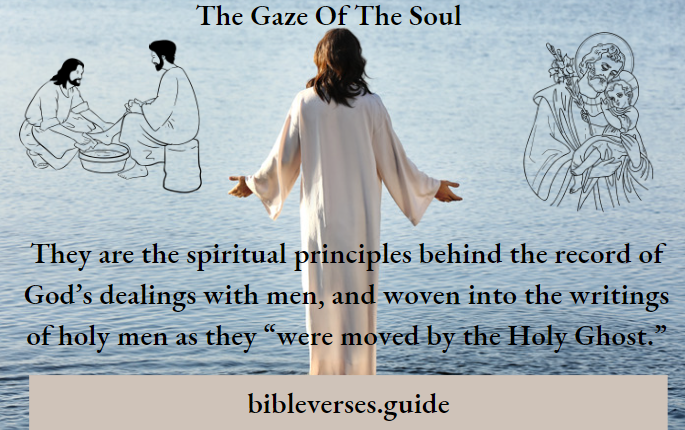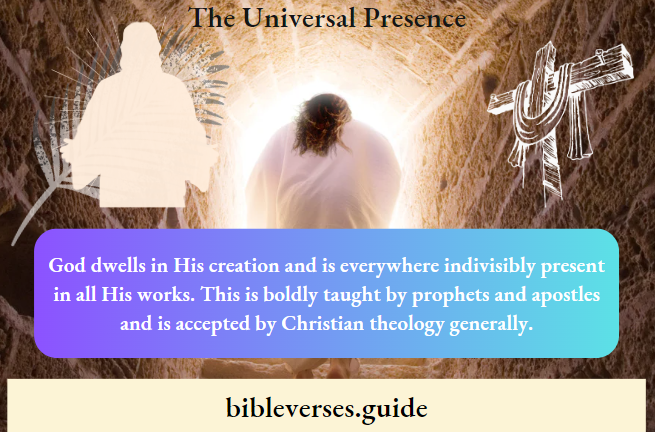The Corruption Of The Self-Life
We can never enjoy deliverance from our self-life before we see something of its total corruption. Let us look at the elder son (in the parable in Luke 15), for he illustrates, perhaps better than anyone else in the Bible, the utter rottenness of the self-life.
The younger son in the parable is usually considered the worst of the two boys. But as we look a little more carefully at the elder brother, we discover that he was just as bad – if not worse.
True, he did not commit the same sins as his younger brother. But his heart was just as crooked and self-centered.
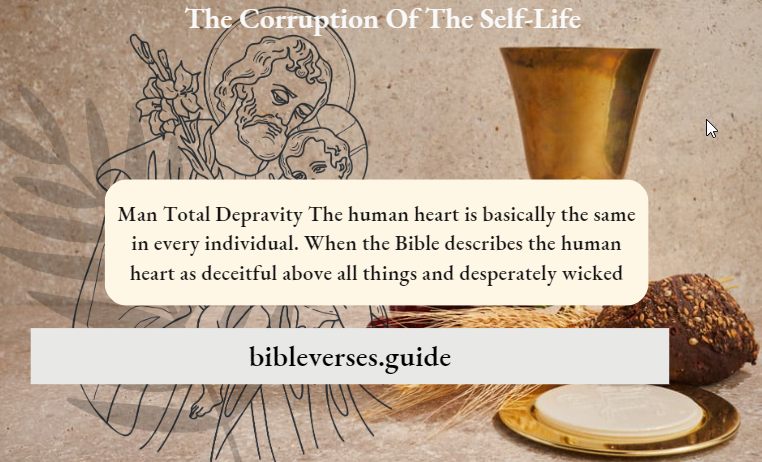
The refinements of civilization, lack of opportunity to commit sin, and a sheltered upbringing may perhaps have kept us from falling into the grosser sins that some others have fallen into. But we cannot, on that count, consider ourselves better than them.
If we had had the same upbringing as they, and if we had faced the same pressures they faced, we would have undoubtedly ended up committing the same sins. This may be a humiliating fact for us to acknowledge, but nevertheless true.
The sooner we recognize this fact, the sooner we shall experience deliverance. Paul recognized that no good thing dwelt in his flesh (Rom. 7:18). That was his first step to freedom (Rom. 8:2).
Men look at outward appearance and call some good and others bad. But God Who looks at the heart sees all men in the same condition. The Bible teaches the total depravity of all men.
Consider Romans 3:10-12, for example: “There is none righteous, (and just in case we think that is an overstatement, it continues to say), no, not one. There is none that understandeth, there is none that seeketh after God.
They are all gone out of the way, they are together to become unprofitable. There is none that doeth good, no, not one” Romans 3:10-20 is a summing up of the guile of all humanity – of the irreligious as well as the religious.
In Romans 1:18-32 we have a description of “the younger son” – the externally immoral and godless man. In chapter 2, we have a portrayal of “the elder son” – the religious man who nevertheless is equally a sinner.
After having described these two categories of people, the Holy Spirit sums up the case by saying that both groups are alike guilty. There is no difference between one and the other.
Man is indeed locally depraved; and if God does not reach down and do something for him, there is certainly no hope for him.
Self-centredness The elder son (Luke 15:25-32) can be taken to symbolize a Christian worker. If the father in the story is a type of God, it would be legitimate to consider the son as a type of child of God – a Christian.
And an active Christian at that – for we see him in the parable coming home after a day’s work in his father’s fields. Here was no lazy young man, sitting at home and enjoying his father’s wealth.
Here was one who worked hard for his father, one who apparently loved his father more than his younger brother did – for after all, he did not leave home and waste his father’s wealth, like the latter.
Apparently, he is more devoted, but actually, as we shall see, just as selfish as his younger brother. It is the picture of a believer active in the Lord’s work and apparently full of devotion to his Lord but still centered on himself.
God has created this world with certain laws built into it. If we ignore those laws, we shall undoubtedly suffer some form of loss and injury. One of the laws God has ordained is that the earth should revolve around the sun.
If the Earth had a will of its own and decided one day that it would no longer be centered in the sun, but would merely revolve around itself, there would then be no change of seasons and very soon all life on Earth would perish. Death would enter in.
Adam, likewise, was created to be centered in God. The day he refused that Centre and chose to be centered in himself – this was what was implied in his choosing to eat of the tree that God had forbidden – he died, as God had said he would.
And let us remember that there is a lesson here for us. In the measure in which our Christian life and service are centered in ourselves, in that measure we shall experience spiritual death – in spite of our being born again and in spite of our fundamentalism.
And all unconsciously, we shall be ministering spiritual death to others too. We may have a reputation as keen and zealous workers for the Father (as the elder son perhaps had), but may nevertheless merit the rebuke of the Lord, “I know your reputation as a live and active (Christian), but you are dead” (Rev. 3:1- LB).
This is a tragic thing, and yet dangerously possible in Christian work. Many a Christian worker lives on the reputation he has built up for himself. Looked up to by others, he is often unconscious of the fact, that God sees him in an altogether different light.
Never having been delivered from self-centredness himself, he is unable to deliver others – even though he may preach (or sing) beautifully. And so, for all of us, a warning is given in the story of the elder son.
Recognizing The Evil Within God often allows times of pressure to come into our lives to bring up from within us our corrupt self-life, so that we begin to see ourselves as we really are. It is fairly easy for us to consider ourselves spiritual when our circumstances are easy.
When we have no problems to tackle, when nobody is irritating us, when things are going smoothly and our co-workers are congenial, we can deceive ourselves about the real state of our hearts.
But wait till we get a servant in our home who irritates us, or a neighbor or a fellow worker who annoys us all the time, and the veneer of spirituality disappears. Our self-life will then manifest itself in all its ugliness.
This was what happened to the elder son. When his younger brother was honored, he got upset. No one would ever have thought that this elder son could have behaved so peevishly. He had appeared such a nice person all along.
But he hadn’t faced pressure like this before. Now, his real nature was manifested. It was not the provocation at that moment that made him evil. No. The provocation merely brought up to the surface what was within all the time.
Amy Carmichael once said that a cup of sweet water could never spill a drop of bitter water, no matter how heavily it was jolted. This is so true. If the bitter water comes out of our lives and our lips, it is because it has always been there.
It is not the provocation or the irritation that makes us unspiritual. They only bring out what is within. And so it should be a matter of deep thankfulness to God that He allows such times to come upon our lives when we see the corruption of our own natures.
If it were not for such occasions, we might never have realized that there was a fountain of corruption within us that no good thing dwelt in our flesh, and that we were totally depraved.
This also teaches us that suppression is not victory. One person may explode in anger in a trying situation, while another, (with a little more self-control), in a similar situation, may only boil inwardly, without any steam escaping through his lips!
In men’s eyes, the second person may have a reputation for meekness. But God Who sees the hearts knows that both men boiled within and considers them both equally bad.
The difference in their external conduct was merely a result of different temperaments which matter nothing to God. If suppression were victory, then I think shopkeepers, salesmen, and air hostesses are among the most Christ-like people that 1 have ever met!
No matter how much their customers tax their patience, they still retain a gracious attitude towards them, for the sake of their business – even though they may be boiling within! No. Suppression is not victory.
God does not want us merely to appear delivered and spiritual – but to be actually so. Paul said, “It is no longer I, but Christ Who lives in me” (Gal. 2:20). This is the point to which God would bring us.
Let us look at the characteristics of the self-life in two aspects. First, its attitude towards God, and second, its attitude towards its fellowmen. We see both of these illustrated in the story of the elder son.
The Self-Centred Life’s Attitude To God
Legalism A spirit of legalism characterizes the attitude of a self-centered life to God and His service. Self can cry to serve God. It can be very active in such service too – but it is always legalistic service.
It seeks a reward for the service it offers to God. “I have served you all these years”, the elder son tells the father, “but you never gave me a kid”. He had served his father for reward all along, but it had not been evident until now.
This moment of pressure brought out the fact. That is how self serves God – not freely, joyfully, and spontaneously, but hoping for a return. The return expected may even be some spiritual blessing and reward from God. But service done with even such a motive is legalistic and unacceptable to God.
The elder son considered his father hard and cruel for not having rewarded his service during all those 1 years. He was like the man who was given one talent, who came up to his master at reckoning time and I said “I’ve kept your talent safe (without trading it for profit) because I was afraid (you would demand my profits) for you are a hard man to deal with” (Luke 19:21 LB).
Self considers God to be so demanding and so difficult to please, and so it strives and strives in God’s service and still condemns itself for not having satisfied the demands of such an austere God.
That is not the type of service that God expects from any of us. The Bible says, “God loves a cheerful giver” (2 Cor. 9:7). In the matter of service too God delights in one who serves cheerfully, neither grudgingly nor of necessity.
He would rather have no service at all, than reluctant service. When one serves for reward, it is but a short while before he is complaining to God that he is not being blessed sufficiently. The matter becomes worse when someone else is more blessed than he.
Do we ever compare our work and the blessing we receive with that of others? This can only be the result of legalistic service. Jesus once told a parable about some laborers who were employed at different hours of the day by a certain man.
At the end of the day the master gave them each a penny. Those who had worked longest came up to the master and complained saying, “How can you give us the same wages as these other people? We deserve more”.
They served for wages, and when they got what they had agreed for, they complained that others should not be given as much as they (Matt. 20:1-16).
This is exactly what we see in the elder son, “How can you give all this to my younger brother. I am the one who has served you faithfully, not he”. When the Israelites served God grudgingly,
He sent them into captivity as He had told them He would: “Because you did not serve the Lord your God with joy and gladness of heart… therefore you will serve your enemies” (Deut. 28:47). No. God has no pleasure in legalistic service.
Self-centered Christians often serve God in order to keep up an impression of spirituality in the eyes of others. It is not pure and fervent love for Christ that keeps them active in Christian work, but the fear that others will consider them unspiritual if they do nothing.
And when such people choose an easy path for themselves and one that will bring them financial gain, they try so hard to convince everybody that God has led them that way!
Wherein is the need for such self-justification, unless there be the secret fear that others may now think less of their spirituality! What strain and bondage there is in serving God like that.
What joy and liberty there is in service that springs out of love for Christ! Love is the oil that lubricates the machinery of our lives so that it doesn’t creak or groan! Jacob labored for seven years in order to obtain Rachel.
And the Bible says that those severe years seemed to him just as a few days, because of his love for her (Gen. 29:20). So will it be with us when our service for God springs out of love. There will be no strain and no drudgery.
The Bible teaches that Christ’s relationship with His church is like that of a husband and wife. What does a husband expect primarily from his wife? Not her service.
He does not marry her, for her to cook his food and wash his clothes, as of first importance. What he desires primarily is her love. Without that, all else is valueless. This is what God seeks from us too.
Unteachability Another characteristic of the self-centered life is its unteachability. When the elder son was angry and stood outside the house, his Father came out and entreated him. But he was stubborn and refused to listen.
Truly, “it is better to be a poor but wise youth than to be an old and foolish king who refuses all advice” (Eccl. 4:13-LB). The one who feels that he knows everything and is therefore unwilling to learn from others is indeed in a sorry state.
The self-centered individual is so sure that he is right that he is unwilling to accept correction. And so he does not like being criticized. Our spirituality is perhaps never so tested as when we are opposed and contradicted.
Dr. A W. Tozer has said that when we are criticized, the only thing that should concern us is whether the criticism is true or false, not whether the person doing the criticism is a friend or an enemy. Our enemies often tell us more truths about ourselves than our friends do.
An unyielding, headstrong disposition is a sure mark of a self-centered individual. And let us remember that a rigid, self-defensive attitude towards our fellowmen is indicative of a similar attitude in our hearts towards God.
If we are unwilling to be taught and corrected by our brethren (even by the youngest among them), it only shows how wrapped up in ourselves we are, in spite of all our spiritual experiences and Bible knowledge.
The father pleads with the elder son, but the latter is hurt and filled with self-pity. The self-centered Christian loves to be coaxed and humored and petted like a little child – even by God.
God has to keep on pleading with such persons, but they do not listen easily. Ultimately, they may find themselves, like the elder son, outside the Father’s house altogether. Do you see how horrible the heart of man is?
The Self-Centred Life’s Attitude To Fellowmen
Jealousy and Love Of Honor When our fellowship with God is strained or broken, it invariably affects our relationships with our fellow men.
When Adam was cut off from the life of God, he immediately lost his love for Eve too. When God asked him whether he had sinned, he accused his wife and said, “Lord, the fault is not mine. It is this woman”.
Jealousy is one of the characteristics of a self-centered life in its attitude to others. The elder son (in the parable) was jealous of his younger brother and this was what made him angry.
All these years the elder son had been the undisputed heir in the house. The servants had bowed to him. But now his position is threatened. Someone else is now the center of attraction in the house.
And he can’t bear to see this. Jealousy, that green-eyed monster, was quick to rear its ugly head in his heart. The self-centered life loves to be noticed by others. It loves the praise of men and is evidently delighted when it is the sole object of admiration.
It loves the highest place and draws attention to itself perpetually in one way or another. The self-centered Christian looks for opportunities to tell others of what he has done for the Lord – perhaps in a very pious way but secretly expecting their appreciation.
And he is very unhappy and uneasy when someone else succeeds or has done something better than himself. The self-centered person is easily upset and touchy. He longs to be recognized by others and to be consulted for his opinions.
In fact, he would be quite offended if he were not consulted in a committee meeting, for example. He has such a high opinion of himself that he loves to talk and talk and talk, thinking that everyone else needs his valuable advice!
There are Christians who, once they open their mouth, find it difficult to shut it again; and who keep on talking not realizing that everyone else around is nauseated. An uncontrolled tongue is one of the marks of an uncrucified self-life.
The self-centered Christian does not know how to take second place graciously and joyfully. He is upset when someone else is given the leadership and he himself has to play second fiddle.
The only time that he is willing to take the second place is when he knows that thereby he can step into the first place on the retirement of the leader!
It was said of the German Kaiser that he always wished to be the center of attraction in every place. If he went to a christening, he’d wish he were the baby; if he went to a marriage, he’d wish he were the bride; and if he went to a funeral, he’d wish he were the corpse! Let us not forget that his heart was no worse than ours.
Self-centredness in a man makes him draw the attention of others to himself, even in the most sacred of activities – whether it be preaching a sermon or writing a prayer letter. It is this, when found in a Christian leader, that hinders the spiritual growth of those to whom he ministers – for he draws people not to Christ but to himself.
One who sat for many years under the ministry of Watchman Nee, the Chinese apostle, said that the thing that impressed him most about Nee’s ministry was that he drew people beyond himself to Christ. This is what God calls each of us to do. But how few actually do this?
Hindering Younger Workers A self-centered Christian leader hinders others below him from becoming leaders, lest his own position is threatened. And so he ministers in such a way as to make himself a necessity to those to whom he ministers.
This is utterly contrary to God’s will. Oswald Chambers once said that anyone who made himself a necessity to some other soul had got out of God’s order. God alone is the only absolute necessity for any human soul. May none of us ever try to take that place.
No one is indispensable in Christ’s Church. God’s work can easily carry on without us. In fact, it can carry on much better without the help of those conceited folk who consider themselves indispensable! We must recognize this fact constantly.
And so, we must be willing to withdraw into the background anytime God calls us to. But the self-centered Christian worker will never accept that. He will want to hold on to his position for as long as possible.
Many such “Christian leaders” are rotting away on their “thrones” today, hindering the work of God. They do not know what it is to fade graciously into the background and let someone else take their place.
You’ve probably heard the saying that success without a successor is a failure. Jesus recognized this and trained people to carry on His work. In 3V£ years He had trained people to take over the leadership.
Paul recognized the necessity of training other people to carry on the work. In 2 Timothy 2:2, he says, “Now Timothy, what I have committed to you. I want you to pass on to other people who will, in turn, be able to train others (right on to the fourth generation)” (Paraphrase).
What Paul was saying in effect was, “You must ensure that you commit this treasure to others. Don’t ever hinder people younger than you, from coming up”. The people in the business world recognize this principle too.
But many Christian leaders do not. Truly, “the children of this world are in their generation wiser than the children of light.”
It is indeed nothing but self-centredness that makes a man jealous of someone younger doing things better than he. Cain was jealous of the fact that Abel had been accepted by God and that he himself had been rejected.
If Abel had been older than he, that might have been tolerable. But it was the awful fact that his younger brother was better than he that made him furious enough to slay Abel.
We see the same in the case of Joseph and his brothers. Joseph received Divine revelations, and that made all his ten elder brothers green with jealousy and they tried to do away with him.
King Saul was jealous of young David, because the women sang, “Saul has slain thousands while David has slain ten thousand”. From that day he determined to kill him. Man’s history – and alas, the history of the Christian Church too – is filled with the same story over and over again.
On the other hand, what a refreshing contrast it is to look at a man like Barnabas in the New Testament. He was a senior worker who took the newly- converted Paul of Tarsus under his wing when no one else would accept Paul.
Barnabas brought him to the church in Antioch and encouraged him. In Acts chapter 13, we read that Barnabas and Paul went out together on a missionary journey.
And when Barnabas saw that God was calling this junior worker, Paul, to a larger ministry than his own, he willingly stepped back and graciously faded into the background.
And the phrase, “Barnabas and Paul” changes almost unnoticed to “Paul and Barnabas” in the book of Acts. The Christian Church suffers
Today, there are few like Barnabas who know what it is to step back and let another be honored. We are willing to step back in matters of no importance.
When passing through a door, for example, we don’t mind stepping back and permitting another to go through first. But in the realms that matter such as position and leadership in the Christian Church – we are not so ready to step back.
Our self-life is so deceitful. We can have a false humility in things that don’t count. But it is in important matters that we see ourselves as we really are.
Pride The self-centered person has an exalted opinion of himself. The elder son said, “All these years I’ve worked hard for you and never once refused to do a single thing you told me to”. He was proud of his obedient service to his father.
Pride arises in our hearts, not because of our virtues and our successes alone, but also because we feel that others around us have not done as well as we have. Pride is always the result of a comparison of oneself with others.
If others around us were obviously better than us, we would never feel proud. If there had been another brother in this story who had served the father more faithfully than the elder son the latter could not have felt proud at all in the presence of the other. But here, he felt, he could compare himself favorably with his younger brother.
“I have served you faithfully”, he tells his father, “but look at this younger son of yours. What has he done? He has wasted his money on harlots”.
It was through pride that Lucifer fell. He compared himself with the other angels and felt that he was wiser, more beautiful, and more exalted than them all. He was the anointed cherub, but he became the Devil. Many others since, have lost God’s anointing in the same manner. You may be like an angel, but pride can turn you into a devil.
This was the disease that the Pharisees were plagued with. Jesus portrayed them accurately in the parable where the Pharisee prays, “Lord, I thank Thee that I am not like other men. I fast and pray and tithe, etc.,” ad nauseam. The self-life is like that.
Sometimes, however, it can be more subtle – as in the case of the Sunday School teacher who after teaching this parable to her class prayed, “Lord, we thank Thee that we are not like the Pharisees”. That is a worse form of pride – being proud of one’s humility.
Pride can often manifest itself in such humble garb. The self-centered Christian worker is not necessarily one who goes about with an overbearing attitude.
He has plenty of false humility on the exterior, a pious lowly appearance, and “humble” talk. But inwardly, he
compares himself with others and glories in his goodness and greatness and “humility”!
Condemnation of Others
Such comparison of oneself with others finally leads to condemnation of others — sometimes with harsh sarcastic expressions. Listen to what the elder son tells his father: “This younger son of yours has wasted your money on harlots”.
Who had given him that information? No one. He had merely assumed the worst. When you hate someone, it is easy to believe the worst possible things concerning him. How the elder son delighted to expose his younger brother’s faults instead of covering them.
Do we see only the faults in other people? Have we secretly delighted in seeing another fall — particularly if he was one whom we did not like?
Our hearts are so wicked that when other people fall, it does not grieve us entirely -on the contrary we are slightly pleased, for it shows us up as better men. Such an attitude is characteristic of a self-centered person.
Do we judge the motives of others? The self-centered person sees someone doing something and says to himself, “I know that he’s doing that”, and proceeds to impute some carnal motive to the action.
How much the self-life takes upon itself – even to sit upon the throne of God (for after all, it is God alone who can judge the motives of others). Paul warns us, “Be careful not to jump to conclusions before the Lord returns as to whether someone is a good servant or not.
When the Lord comes, He will turn on the light so that everyone can see exactly what each one of us is really like, deep down in our hearts. Then everyone will know why (the motive with which) we have been doing the Lord’s work” (1 Cor. 4:5-LB). Only when the Lord returns (and not till then) will we know the real motives of each person.
Lovelessness The self-centered person does not have any real love for his fellowmen and this is the root cause of his hard attitude towards them. He may pretend to show much love but lacks genuine Christlike love.
The elder son had never gone to his father even once in all those years, volunteering to go and search for his lost brother. He did not care whether his brother was dead or alive.
All he was interested in was to make merry with his friends (v. 29). So long as he was happy, it did not matter to him what happened to others.
Are we wrapped up in ourselves like that? What is our attitude to backsliders? It is easier to love an unbeliever than a backslider. But if we truly have the compassion of Christ, we shall love both. The younger son in this story is a picture of a backslider.
It’s easy to condemn him. It is more difficult to love him and help him. The Bible says, “If a Christian is overcome by some sin, you who are godly should gently and humbly help him back onto the right path” (Gal. 6:1- LB).
And again, “If you see a Christian sinning…. you should ask God to forgive him and God will give him life” (1 John 5:16-LB). Do we ever pray like that for those who have fallen? No. Why not? Because we are so centered on ourselves.
When we seek a deeper life and a closer walk with God, let us never forget that a deeper life should make us more outgoing. God does not grant us a closer walk with Him merely for us to “make merry with our friends”.
It is so easy for us to get into our little holy huddles (with those who believe as we do) and to think of our enjoyment alone – all the time looking down on those who have not had our “deeper life experience”. That is not the deeper life at all. That is self-centredness under the guise of spirituality, and it is an abomination to God.
Let us not be deceived. If we are only interested in “making merry” (even though it be spiritual merrymaking) with other members of our “spiritual clique”, and are unable to fellowship with believers who do not see eye-to-eye with us, then we are indeed in a state of spiritual stagnation.
The Bible says, “He who does not love his brother is abiding in death” (1 John 3:14). The word translated as “love” in this verse is the Greek word agape, which means “to value”, “to feel a concern for”, “to be faithful to” and “to delight in”.
And so this verse really means that if we do not value our brothers and sisters (even those in other denominations than our own) if we do not feel a concern for them, if we are not faithful to them, and if we do not delight in them, then, in spite of all our Bible knowledge and our spiritual experiences, we are in a state of spiritual death.
The Primary Ministry of the Holy Spirit We may be young or old, Calvinists or Arminians with any number of experiences and blessings to our credit, but self dies hard, I’ll tell you that.
We must know what it is to take up the cross daily and follow Jesus if we are to live in victory over ourselves.
There is no other way. We shall come to that in greater detail in the ensuing chapters. But let us remember meanwhile, that the primary ministry of the Holy Spirit in our lives is to help us overcome our self-centredness.
The Bible says, “We naturally love to do evil things that are just the opposite to the things that the Holy Spirit tells us to do, and the good things we want to do when the Spirit has his way with us are just the opposite of our natural desires.
These two forces (our self-life and the Holy Spirit) are constantly fighting each other to win control over us” (Gal. 5:17-LB). These days, particularly, when many Christians are confused about the ministry of the Holy Spirit, it is good for the US to bear in mind that His chief ministry is to help us put co-teach the deeds of the flesh (the self-life).
He does many other things in and through us. Let us not despise any of them. But this is His primary ministry – to put the self-life to death – and if we are not allowing Him to carry out this in our lives, then all our other experiences are valueless.
The Bible says, “If you live after the flesh, you will die, but if you through the Spirit put to death the deeds of the flesh (and we’ve just seen some of the deeds of the flesh in this chapter), you will live for as many as are led by the Spirit (in this way) are the sons of God” (Rom. 8:13, 14).
Verse 14 is often quoted out of context and made to refer to the Spirit’s guidance In relation to where we are to go or what we are to do.
But it is really connected with the previous verse and refers to the Holy Spirit leading us to put to death our self-centered desires. The verse also teaches that this is the identifying mark of the sons of God.
In the parable in Luke 15, we notice that the father’s love was the same for both his sons. He did not love the elder son any less than the younger. He came out of his house for both his children.
When his younger son came home, he went out of the house to welcome him, and when his elder son refused to come into the house, he went out to invite him in too. In fact, he even tells him, “Son, you are ever with me and all that I have is yours”.
Do you see the largeness of God’s heart even toward self-centered individuals? He loves us and wants to give us all that He has. But He has to deliver us from our self-centredness first.
God does not love the harlot more than the self-righteous Pharisee. He loves both equally and He gave His Son to die for both. But the response in the hearts of the two may be different, and that is what “makes the difference ultimately in the Father’s house.
The younger son who was once away from the father’s house is now sitting at the table enjoying his father’s riches. The elder son who had been inside all along is now outside.
Truly, as the Lord said, many who are first now will be last in eternity, and many who are last here will be first there.
It is only as we are willing to humble ourselves acknowledge our corruption and respond wholeheartedly to the Father’s love, that we shall be able to feast with Him at His table. May the Lord speak to our hearts.

